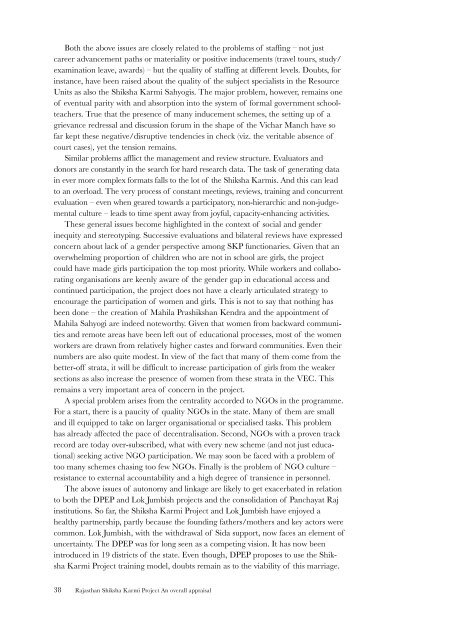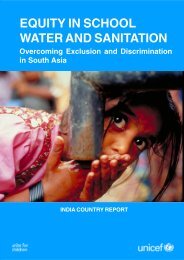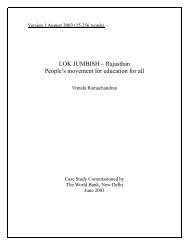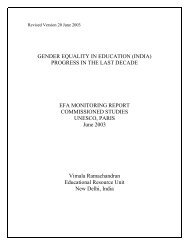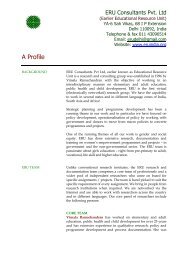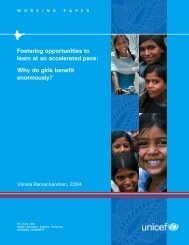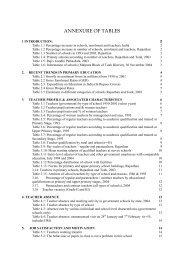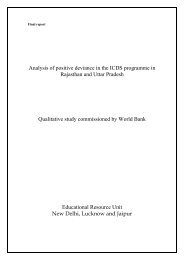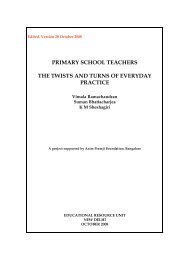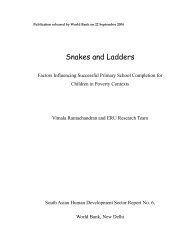Rajasthan Shiksha Karmi Project An overall appraisal
Rajasthan Shiksha Karmi Project An overall appraisal
Rajasthan Shiksha Karmi Project An overall appraisal
Create successful ePaper yourself
Turn your PDF publications into a flip-book with our unique Google optimized e-Paper software.
Both the above issues are closely related to the problems of staffing – not justcareer advancement paths or materiality or positive inducements (travel tours, study/examination leave, awards) – but the quality of staffing at different levels. Doubts, forinstance, have been raised about the quality of the subject specialists in the ResourceUnits as also the <strong>Shiksha</strong> <strong>Karmi</strong> Sahyogis. The major problem, however, remains oneof eventual parity with and absorption into the system of formal government schoolteachers.True that the presence of many inducement schemes, the setting up of agrievance redressal and discussion forum in the shape of the Vichar Manch have sofar kept these negative/disruptive tendencies in check (viz. the veritable absence ofcourt cases), yet the tension remains.Similar problems afflict the management and review structure. Evaluators anddonors are constantly in the search for hard research data. The task of generating datain ever more complex formats falls to the lot of the <strong>Shiksha</strong> <strong>Karmi</strong>s. <strong>An</strong>d this can leadto an overload. The very process of constant meetings, reviews, training and concurrentevaluation – even when geared towards a participatory, non-hierarchic and non-judgementalculture – leads to time spent away from joyful, capacity-enhancing activities.These general issues become highlighted in the context of social and genderinequity and stereotyping. Successive evaluations and bilateral reviews have expressedconcern about lack of a gender perspective among SKP functionaries. Given that anoverwhelming proportion of children who are not in school are girls, the projectcould have made girls participation the top most priority. While workers and collaboratingorganisations are keenly aware of the gender gap in educational access andcontinued participation, the project does not have a clearly articulated strategy toencourage the participation of women and girls. This is not to say that nothing hasbeen done – the creation of Mahila Prashikshan Kendra and the appointment ofMahila Sahyogi are indeed noteworthy. Given that women from backward communitiesand remote areas have been left out of educational processes, most of the womenworkers are drawn from relatively higher castes and forward communities. Even theirnumbers are also quite modest. In view of the fact that many of them come from thebetter-off strata, it will be difficult to increase participation of girls from the weakersections as also increase the presence of women from these strata in the VEC. Thisremains a very important area of concern in the project.A special problem arises from the centrality accorded to NGOs in the programme.For a start, there is a paucity of quality NGOs in the state. Many of them are smalland ill equipped to take on larger organisational or specialised tasks. This problemhas already affected the pace of decentralisation. Second, NGOs with a proven trackrecord are today over-subscribed, what with every new scheme (and not just educational)seeking active NGO participation. We may soon be faced with a problem oftoo many schemes chasing too few NGOs. Finally is the problem of NGO culture –resistance to external accountability and a high degree of transience in personnel.The above issues of autonomy and linkage are likely to get exacerbated in relationto both the DPEP and Lok Jumbish projects and the consolidation of Panchayat Rajinstitutions. So far, the <strong>Shiksha</strong> <strong>Karmi</strong> <strong>Project</strong> and Lok Jumbish have enjoyed ahealthy partnership, partly because the founding fathers/mothers and key actors werecommon. Lok Jumbish, with the withdrawal of Sida support, now faces an element ofuncertainty. The DPEP was for long seen as a competing vision. It has now beenintroduced in 19 districts of the state. Even though, DPEP proposes to use the <strong>Shiksha</strong><strong>Karmi</strong> <strong>Project</strong> training model, doubts remain as to the viability of this marriage.38 <strong>Rajasthan</strong> <strong>Shiksha</strong> <strong>Karmi</strong> <strong>Project</strong> <strong>An</strong> <strong>overall</strong> <strong>appraisal</strong>


